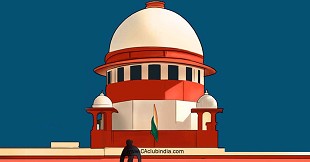Articles by Abhishek Raja
Gold in any form fails to pass the test of second-hand goods - Kerala AAR
Abhishek Raja 20 July 2023 at 14:27According to a recent ruling by the Kerala Authority for Advance Ruling (AAR), tax reductions provided under Rule 32(5) of the Central Goods and Service Tax (CGST) Rules are not applicable when gold is not considered a second-hand commodit
Big blow to Service Tax Department as Mumbai CESTAT remands major case for fresh adjudication!
Abhishek Raja 15 July 2023 at 06:51The legality of the order made by the Commissioner of Service Tax, Mumbai-VII is under scrutiny in this appeal.
GST department issues show-cause notices to several insurers in India
Abhishek Raja 28 June 2023 at 09:04Here is an article on the basis of the news items that show-cause notices have been issued to various insurance companies in India and what action they have taken.
The Essence of Personal Hearing in GST Adjudication
Abhishek Raja 19 June 2023 at 16:15A Case Analysis of Concord Tieup Pvt. Ltd. vs The State of Madhya Pradesh
Pros and Cons of the proposed pre-filled GST return forms
Abhishek Raja 15 June 2023 at 08:59The consolidated form, being readied by the Central Board of Indirect Taxes and Customs, will allow the GST-payers to view all of their transactions as well as e-invoices.
GST evasion notice: GST Department to move SC against HC relief to Gameskraft
Abhishek Raja 08 June 2023 at 16:03The revenue department has decided to move Supreme Court against the Karnataka High Court order that quashed a Rs 21,000-crore GST show-cause notice on Bengaluru-based online gaming company Gameskraft.
General Penalty u/s 125 of CGST Act
Abhishek Raja 07 June 2023 at 08:56Section 126 of the CGST Act lays down certain guiding principles that must be followed while imposing penalties under the GST regime. These principles ensure that the penalties are imposed fairly, objectively, and in a proportionate manner.
Delhi's GST Collection Over Rs. 34,000 Crores in 2022: Delhi Finance Minister Kailash Gahlot
Abhishek Raja 03 June 2023 at 09:13Delhi Finance Minister Kailash Gahlot said the collection of GST and VAT in the city was more than Rs.34,000 crores in 2022-23, and claimed Delhi will be a leading state for tax administration through the intervention of artificial intelligence.
Last Chance: Extended Due Date for GTA Payments Expires Tomorrow!
Abhishek Raja 30 May 2023 at 08:55Tomorrow i.e 31st May 2023 is the extended due date for Opt-in / Opt-out for Forward Charge / Reverse Charge for FY 2023-24 [Notification No.03/2022 - CT(R) dated 13.07.2022]
Expected key points to be discussed in the upcoming GST Council Meet
Abhishek Raja 22 May 2023 at 08:41GST Council to meet on June 22-23 to discuss key issues. The GST Council is scheduled to meet on June 22-23 to discuss a number of key issues, including the extension of the compensation cess, rationalization of rates, and the implementation of e-way bill 3.0.
Popular Articles
- No More Forced ITC Order: New Rules from Jan 2026
- Income Tax Return Filing Due Date For AY 26-27: Full Details With New Updates
- Revised Return Due Date Extension
- TDS Rate Chart For Tax Year 2026-27: With Revised Section Codes in Challans
- Tax Deduction Rules for Employee Contributions From April 2026
- Simplified GST Changes in Budget 2026: Finance Bill 2026 CGST and IGST Amendments
- ICAI, ICSI & ICMAI to Launch Short-Term Courses to Develop 'Corporate Mitras' in Tier-II & III Towns
- Income Tax Amendments in Budget 2026: Topic-wise Summary of Key Proposals
Trending Online Classes
-
DT & Audit (Exam Oriented Fastrack Batch) - For May 26 Exams and onwards Full English
 CA Bhanwar Borana & CA Shubham Keswani
CA Bhanwar Borana & CA Shubham Keswani -
IDT LIVE Exam Oriented Batch | May 2026, Sept 2026 & Jan 2027
 CA Arpita Tulsyan
CA Arpita Tulsyan













 CAclubindia
CAclubindia
